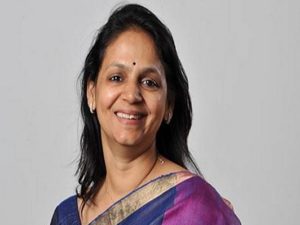 13-07-2020
13-07-2020
Be cognizant to mental health, don’t force employees to video call round the clock: Vishakha R M, MD&CEO, IndiaFirst Life Insurance

 Insurance Alertss
Insurance AlertssBe cognizant to mental health, don’t force employees to video call round the clock: Vishakha R M, MD & CEO, IndiaFirst Life Insurance
Mental health of employees is something that needs to be taken care of. Sadly, sometimes it is taken as a weak point to talk about and makes it even more difficult to raise the topic. When someone says I am finding it difficult to handle my stress, our upbringing is so, that the person is judged for saying so, which is very unfortunate. Just because you don’t understand something, you don’t count it important, said Vishakha R M, Managing Director & Chief Executive Officer, IndiaFirst Life Insurance Co. Ltd, during the recently concluded Elets BFSI NextGen Virtual Summit.
According to World Health Organisation (WHO), globally, an estimated 264 million people suffer from depression, one of the leading causes of disability, with many of these people also suffering from symptoms of anxiety.
A recent WHO-led study estimates that depression and anxiety disorders cost the global economy US$ 1 trillion each year in lost productivity. Unemployment is a well-recognized risk factor for mental health problems, while returning to, or getting work is protective. A negative working environment may lead to physical and mental health problems, harmful use of substances or alcohol, absenteeism and lost productivity. Workplaces that promote mental health and support people with mental disorders are more likely to reduce absenteeism, increase productivity and benefit from associated economic gains.
Sharing her views on mental health of employees and a safe workplace, Vishakha R M said, “It is very important to be very cognizant of individuals. There are people who are introverts and there are people who are extroverts. You really need to draw energy around them so, that they perform.”
She added, “I do believe that mental health of the employees is something that we need to take care of. It is sometimes taken as a weak point to talk about and taken makes it even more difficult to raise the topic. When someone says I am finding it difficult to manage, our upbringing is so, that we judge the person, which is very unfortunate. Just because you don’t understand something, it doesn’t need importance.”
Commenting on her personal practice to address the issue, she said, “What are we doing as an organisation is focusing on empathy. I have asked the management not to impose their level of comfort on others. Every team comprises of people who come from different background, geographical area.” Vishakha also spoke about the rising usage of video conferencing and growing pressure to be on the video call all the time, emerging as a major source of stress.
“Especially in cities like Mumbai, there isn’t enough privacy and space to work and we need to be very cognizant of that. There are situations during a video conversation where people insist to let the video on, I just request them to let go. You don’t need to monitor everything, you just need contribution. So, don’t involve more people than necessary. The fashionable thing that came about with video conferencing is you just started roping everybody in. You would necessarily do that during a physical meet at office and since it is a video call you just bring in everyone,” she stated.
“It is very important to be very cognizant of individuals. There are people who are introverts and there are people who are extroverts. You really need to draw energy around them so, that they perform. It is very important for the team leaders to understand these needs and try and provide them the comfort that helps them perform better. We need specific timeouts to discuss casuals stuff.” “Before Covid, when you used to move from one desk to another, you had this brief casual conversations with your colleague on your Kids progress our Friday plan but now with video conferencing and virtual team meets those casual talks are gone,” added Vishakha.
It is to be noted that for the video conferencing platform Zoom, India represents a significant portion of its 300 million daily meeting participants globally. “We have grown from 10 million participants a day to over 300 million participants a day on our platform and that’s happened in a period of 12 weeks,” Zoom’s India head and General Manager Sameer Raje told indianexpress.com.
Source: Bfsi.eletsonline.com
